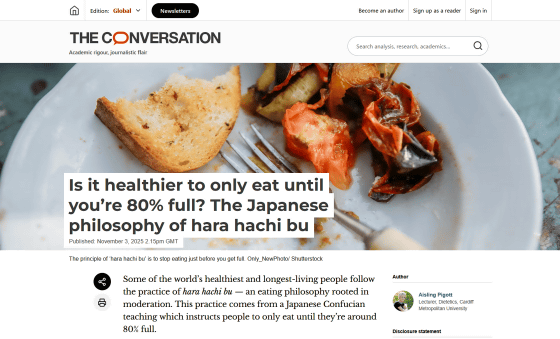Experts explain that Japan's simple eating habit of 'eating until you're 80% full' can help prevent weight gain and improve your health

In Japan, there is a concept called 'hara-hachibu,' which means eating only until you are about 80% full, rather than until you are full.
Is it healthier to only eat until you're 80% full? The Japanese philosophy of hara hachi bu
https://theconversation.com/is-it-healthier-to-only-eat-until-youre-80-full-the-japanese-philosophy-of-hara-hachi-bu-268008

The concept of eating 80% of your body comes from the health guide ' Yōjōkun ' written by Kaibara Ekiken, a Confucian scholar from the Edo period, and has recently been gaining attention as a dieting method. However, Piggott argues that 80% should not be seen as a way to restrict your diet, but rather as a way to slow down your mealtimes and learn to be mindful and grateful.
To date, scientific research on 80% saturates has been limited, but available evidence suggests that it may reduce total daily calorie intake. It has also been associated with reduced long-term weight gain and a lower average body mass index (BMI). Men who practice 80% saturates also tend to adopt healthier eating patterns , such as consuming more vegetables and less grains.
Additionally, eating until you're 80% full shares many similarities with mindful eating and intuitive eating , which both have been shown to reduce emotional overeating and improve the quality of your meals.
In particular, in recent years, 70% of adults and children use digital devices while eating, which has been linked to increased calorie intake , decreased fruit and vegetable intake , and an increase in eating disorders . 'We deify food, obsess over it, talk about it, post about it, but too often we don't actually enjoy it. We've lost our connection to and gratitude for food,' said Piggott.

Piggott argued that eating only until you're 80% full can help you become more aware of your food, take time to savor it, and enjoy your meal, which can help rebuild the connection between your body and food and lead to healthier eating habits. He also shared seven pieces of advice for anyone who wants to try the 80% full diet.
◆1: Discover the true nature of your hunger
Before eating to relieve hunger, it's important to ask yourself, 'Am I really hungry?' and 'What kind of hunger is it?' If you're physically hungry, you should just eat, but sometimes you just want to eat because you're bored, tired, or stressed. Taking time to think carefully before eating can help prevent eating from becoming a way to cope with issues other than hunger.
◆2: Eat without distractions
Many people are in the habit of using their smartphones or watching TV while eating, but when practicing the '80% full' rule, you should step away from the screen and concentrate on your meal. Paying attention to the screen can interfere with your sense of fullness, which can lead to overeating.
◆3: Savor each bite slowly
Eating should be a sensory experience that fills you up, and eating slowly helps you detect when you're full and know when to stop.

◆4: Aim for a pleasant feeling of fullness
If you rate complete hunger as '1' and feeling so full you want to lie down as '10,' then eating until you're 80% full is about an '8.' To aim for a '8' feeling of fullness, it's important to eat slowly and listen to your body's cues.
◆5: Eat with others whenever possible
One of the most important aspects of eating is the connection and conversation with others. Communication during meals is unique to humans and is said to be the key to longevity.
◆6: Get plenty of nutrition
Eating until you're 80% full is just a guideline for feeling full, and it's not the same as a restrictive diet where you drastically reduce the amount of food you eat or eliminate certain foods. 'Make sure your meals are rich in vitamins, minerals, fiber, and energy,' advises Piggott.
7. Be compassionate towards yourself
The point of eating only until you're 80% full is that you don't have to strive for the 'perfect diet.' The important thing is to be aware of your body, not feel guilty about what you're eating.

If dieting by changing your eating habits is viewed as a means to lose weight, there is a risk of excessive calorie restriction and nutritional deficiencies, which can lead to overeating as a reaction. On the other hand, eating until you're 80% full is different in that it doesn't involve restricting your diet, but rather encourages eating in moderate portions and in a way that suits your body. Piggott points out that eating until you're 80% full is not suitable for everyone, and that for athletes, growing children, the elderly, and those with illnesses who need more nutrition, eating until you're 80% full may not be enough.
'While 80% saturation is often trivialized as a simple guideline of 80% fullness, its essence reflects the broader principle of conscious moderation,' Piggott said. 'At its core, 80% saturation is about listening to your body and avoiding overeating, while also respecting hunger and being grateful for food as a source of energy. It's a timeless practice that should be practiced.'
Related Posts:
in Free Member, Science, Food, Posted by log1h_ik







